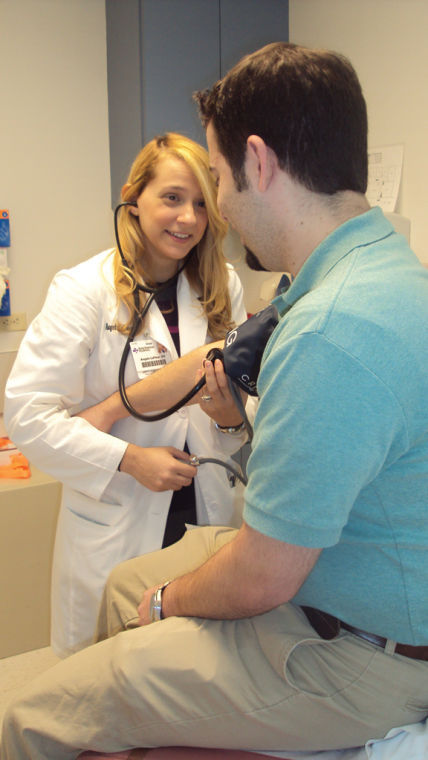Don’t let diabetes dampen your Thanksgiving holiday
Published 12:00 am Wednesday, November 27, 2013
November is the start of the holiday season – a time to celebrate fun, family and food. It also is a time to consider a medical condition that affects nearly 26 million Americans. Here in South Louisiana, most of our festivities revolve around wonderful, Cajun food; therefore, many residents are unfortunately living with diabetes.
Diabetes is a condition that causes blood sugar levels to rise higher than normal. Our bodies break down the food we eat into glucose, or sugar, so it can be used for energy. A hormone called insulin helps the glucose get inside our cells. When our bodies don’t make enough insulin or the insulin we have isn’t being used properly, sugar starts to build up in the blood. Complications from diabetes can include blindness, heart disease, hearing loss, kidney failure, severe nerve damage leading to limb amputations and strokes.
“The worst complications from diabetes often occur when the disease goes unchecked,” said Dr. Angele LaFleur, an Internal medicine physician at River Parishes Hospital.
It is important for patients with diabetes to have regular visits with their primary care physician to avoid complications. A diabetic patient’s physical activity, blood sugar readings, blood pressure and diet must be closely monitored. It is important to regularly inspect the feet of a diabetic patient for peripheral neuropathy (tingling, pain, numbness or weakness) as over time diabetes can cause nerve damage, especially in the legs and feet. Examining the feet is also a good way to prevent or detect early signs of skin breakdown or ulcers because the nerves that control the oil and moisture in the feet may no longer work and ulcers may form that the patient may not be able to feel. Every diabetic patient should see an ophthalmologist for an eye exam once a year because high blood sugar levels can cause eye problems, including glaucoma and cataracts. Finally, a diabetic patient’s kidney function should be monitored closely as high blood sugar can overwork the kidneys, causing them to stop working properly.
So, you’ve been recently diagnosed with diabetes. What can you do to keep your blood sugar level within normal range? Both Type 1 diabetes, in which the body does not produce insulin, and Type 2 diabetes, in which the body doesn’t produce enough insulin or the cells ignore the insulin, can be controlled with medication, diet and exercise. Diet, exercise and weight loss may eliminate the need for medication in Type 2 diabetes.
“Living in South Louisiana can make it difficult to stick to a particular meal plan,” comments LaFleur. “Plus, with the holidays approaching, many patients became frustrated and overwhelmed at the thought of dieting. For that reason, I’ve begun to discuss the method of carbohydrate counting with my patients so they can still eat the foods they enjoy and, at the same time, continue to monitor their diabetes.”
When people eat carbohydrates, their bodies turn it into sugar. Therefore, the most common culprit to elevated sugar levels is the infamous carbohydrates. Simple carbohydrates include table sugar, honey, corn syrup and sugars in milk and fruit. Complex carbohydrates include whole grains, vegetables and beans. Believe it or not, a person with diabetes can enjoy some of these foods. Diabetic patients are urged to stick to carbohydrates found in low fat milk, fruit and vegetables and to avoid honey, sweets and sugar filled sodas. Low sugar sweets are a wonderful option. In addition, stay away from white flour and white rice and choose whole grains and beans instead.
Carbohydrate counting is a method of keeping track of the number of carbs a person eats at each meal. This allows diabetic patients more flexibility in the foods they choose to eat. Diabetic patients should consume between 45-65 percent of their daily calories in carbohydrates and the rest from protein or fat. Generally, men should eat between 50-65 grams of carbs daily, and women should eat between 30-55 grams of carbs daily. Patients who are currently at their ideal body weight can increase their daily carbohydrate intake by 10 grams. One serving of carbohydrates is 15 grams which is equal to the amount of carbs in one slice of bread, 3/4 cup of dry unsweetened cereal, 1/2 cup of pasta, one cup of milk or a piece of fresh fruit. Lean meats generally contain little to no carbs. One serving of vegetables contains 5 grams of carbs. For instance, a diabetic patient can eat 1/2 cup of cooked vegetables or 1 cup of raw vegetables and only consume 5 grams of carbs. Keep in mind; this is without any additional ingredients such as butter.
Dr. LaFleur encourages patients to try the carbohydrate method and to keep a daily glucose diary.
“This method will help prove to yourself that your hard work is paying off,” said LaFleur. “Your confidence will be boosted, and you will be on the way to success.”
LaFleur offers some helpful tips and suggestions regarding healthy eating. Become familiar with serving sizes and always read the food labels. Keep in mind that most restaurants post the nutrition level for food items on their websites. Once a meal plan is developed, be consistent with the amount of carbs consumed each day. Patients should share their thoughts and concerns with their primary care physician. Diets can be hard to stick to because patients generally feel restricted in the types of food they can eat. So, switch it up.
To learn more about diabetes and the carbohydrate method, visit the American Diabetes Association at www.diabetes.org. River Parishes Hospital has a registered dietitian who can assist patients in developing a meal plan. It also hosts monthly Diabetes Support Group Meetings for patients with diabetes and their family or caregivers to get education, emotional support and encouragement from others with this disease. A physician’s order is required to schedule nutrition counseling. For more information about the Diabetes Support Group Meetings, call 985-651-1524.
Dr. Angele LaFleur is an internal medicine physician on staff at River Parishes Hospital. She is affiliated with the practice of Dr. José Cuscó, an internal medicine physician. Her office, the River Parishes Internal Medicine Clinic, is located in the River Parishes Hospital Medical Pavilion at 502 Rue de Santé, Suite 308 in LaPlace. Appointments may be made by calling 985-652-3500.







